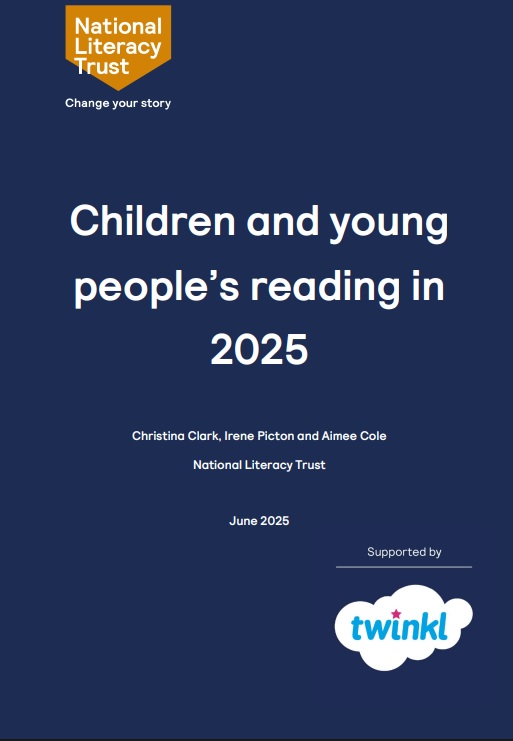NLT's 2025 reading report marks 20-year low in reading for pleasure
Posted on Monday, June 2, 2025
Category: News

A 2025 report by the National Literacy Trust into reading for enjoyment has found that the number of children and young people's who say they enjoy reading is at a 20-year low. The research is taken from surveys of more than 110,000 children and young people in the UK aged five to 18 years.
The findings reflect other recent reports, including Children's Reading: How do we move from endurance to enjoyment? by publishers HarperCollins and Farshore, and the Reading Rights report, highlighting the inequalities in access to reader development by Children's Laureate Frank Cottrell Boyce.
Report highlights
Only 1 in 3 (32.7%) children and young people aged 8 to 18 say they enjoy reading in their free time. This marks a 36% decrease in reading enjoyment levels since the NLT first asked this question in 2005. The drop in reading enjoyment over the last year has been especially steep among primary-aged children and boys, particularly boys aged 11 to 16. More children not receiving FSMs read daily (19.4%) than those who receive FSMs (15.8%).
Only 1 in 5 (18.7%) of those who responded to the survey said that they read something daily in their free time, the lowest level recorded by the NLT, with daily reading levels falling by nearly 20 percentage points since 2005. Among children aged 5 to 8, where daily reading is so important as they develop as readers, reading rates dropped by 3.4 percentage points in the past year to 44.5%. There has been a fall of 9.1 percentage points since the NLT started asking this age group in 2019.
What would motivate children and young people (8 to 18) to read?
The NLT's research helps to shine a light on what is driving or deterring reading for enjoyment. They found that In 2025:
2 in 5 children and young people were motivated to read when material related to a favourite film or TV series (38.1%) or matched their interests or hobbies (37.1%)
3 in 10 (30.9%) were drawn in by an interesting book cover or title.
1 in 4 (26.6%) valued having the freedom to choose what they read.
Children and young people who report low levels of reading enjoyment, though less engaged, still recognise reading's educational value (nearly half said it helps them learn new words or new things). Many also chose to read song lyrics, news articles, fiction, comics and fan fiction in their free time, highlighting what might re-engage this group with reading.
The findings suggest that this group would benefit from reading being aligned with personal interests and other media that children and young people already recognise as part of their cultural life.
Rising gender gap
Girls continue to read daily at higher rates than boys, with the gender gap widening to 6.2 percentage points - the largest seen since 2023. While more girls read for wellbeing and emotional support, more boys leaned toward reading to connect with causes or the wider world. Reading to build knowledge and skills was equally strong across genders.
Which formats appeal to young readers?
The new research found that half (49.3%) of children and young people still read fiction or short stories in print each month. Non-fiction is also popular, with two in five (40.1%) reading non-fiction books, while comics and graphic novels (29.2%) and magazines (21.3%) also remain popular choices. Digital formats dominated in other categories, with song lyrics (60.7%) and news articles (28.2%) mostly read on screens.
Moving forward
The NLT's research, while highlighting the worrying trend in children and young people's reading for enjoyment, suggests that re-engagement is possible, especially if reading opportunities are personalised around interests, allow autonomy in choice, and link reading to other media children and young people already recognise as part of their cultural life.
Read the 2025 research report in full
Why is reading for pleasure important?
Research as shown that reading for pleasure can support reading, and wider literacy, skills, wellbeing, empathy, confidence and aptitude for learning. NLT's 2024 research showed that twice as many children and young people who enjoy reading in their free time had above average reading skills than children who don't enjoy it (34.2% vs 15.7%).
As this year's report reminds us, children and young people who enjoy reading will read more, which will support a child's developing reading skills - bringing all the benefits of wellbeing, empathy and willingness to learn. In short, reading skills will help them thrive in school and beyond, and help them discover new things about the world around them.
